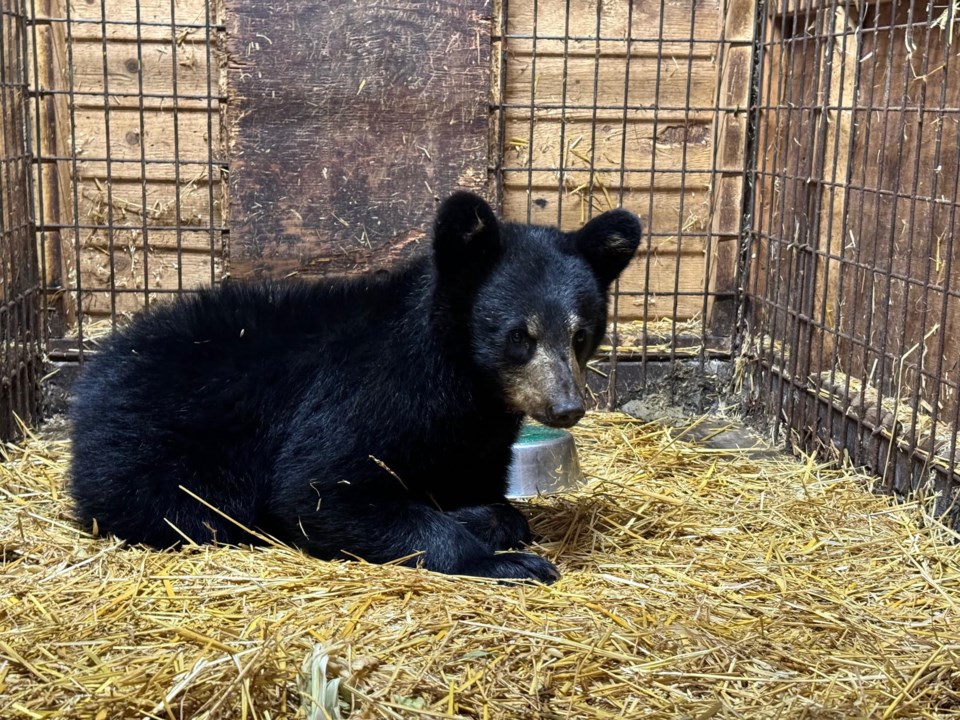A bear cub injured in Northern Ontario embarked on an unusual 10-hour journey to Windsor, receiving an unconventional Taco Bell meal along the way.
Mike McIntosh, the founder and president of Bear With Us, now has the cub — who they've named Windsor — in his care. He’s speaking out in hopes of educating the public on what to do if they find an injured or orphaned bear.
“There was a lot of available help for that bear cub closer to Cochrane than Windsor. There’s rehabbers that look after bears including myself. They went by one of us to get to Windsor, so, I’m not sure why the poor decisions were made, I won’t speculate there, but it could have been handled better,” McIntosh said.
"A 10-hour ride for an injured bear that’s not doing very well could have been life threatening.”
On Saturday (Aug. 31), the cub, believed to be around eight or nine months old, was found in poor condition on Highway 11 just south of Cochrane.
People from Windsor picked the bear up and took it to Windsor, feeding it Taco Bell on the way. A woman who was friends with one of the people who had the bear texted McIntosh about the situation.
McIntosh called the prevention control unit and Ministry of Natural Resources, who sent the police the Windsor address provided by the woman,
Police instructed the individuals to take the cub to Chatham-Kent's Pet and Wildlife Rescue Centre.
On Sunday, McIntosh met volunteers from the Chatham rescue halfway to pick up the bear, who's now in the care of the Sprucedale sanctuary.
“He, obviously, was suffering from a pretty badly bruised body and some head trauma. So he wasn't really that with it when I received him. He was pretty semi-conscious, in and out, but now he seems to be walking OK, no indication of broken legs, and he's eating OK, so he's on his way to recovery.”
Windsor will be released back into the wild in the Cochrane district next summer.
“Mother bears and their cubs stay together as a family for a period of about a year-and-a-half. The mother bears part company with the cub usually in June, sometimes July. The cubs are, at that time, at an age of being able to look after themselves. So we follow that pattern,” said McIntosh.
“It’s not just about physical size but their behaviour. They’re more independent at that age. We want them to have the best chance in the wild and also have the best chance of not potentially creating conflict with people down the road.”
Had the cub not been subdued because of being hit, the ride down south could have taken a turn for the worse, McIntosh said.
“Even being a cub, if it came around and decided it was scared, it could create a lot of havoc in a vehicle. So that was not a wise thing to do,” he said.
How to be Bear Wise
If someone encounters an injured or orphaned bear, McIntosh said the first step should be to call Be Bear Wise.
“If it’s a bear cub who's totally out of it or badly injured, the next best step would be to get a hold of a nearby centre and take the cub there. But definitely not drive it all the way back to Windsor,” he said.
Bear With Us, a sanctuary and rehabilitation centre for bears, takes in bears from across Ontario and was established by McIntosh in 1992. It became a registered Canadian charity in 2000 and survives solely on the public’s donations.
When McIntosh spoke with TimminsToday on Thursday (Sept. 5), he was driving to the Hungry Bear Restaurant north of French River to pick up three orphaned cubs, bringing the total number of bears they have in their care to 18. All of the bears will be released back into the district they came from.
McIntosh said he started Bear With Us to help people learn about the real nature of bears.
“Which is not what we see in movies or on TV. They’re not the long fang growling animal that’s as dangerous as many perceive. They have the capability to be dangerous, most often as self defence, but rarely does that happen when it comes to people,” he said.
“More often than not they’re just looking for food. And since they’re primarily vegetarians, they’re looking for foods that are sweet and high calorie. Bird seed is the number one attractant around human establishment. Or our food waste in garbage, which is the number two attractant. If people avoid offering food to bears, there will be much less human-bear conflict, and, therefore, many less injured bears and orphaned cubs.”
It’s also important to keep dogs on leash if individuals are in an area where there could be bears.
“Bears attacking people is quite rare, but over 50 per cent of bear attacks are initiated by a dog off leash,” he said.
To learn more or to support Bear With Us visit their website here.



